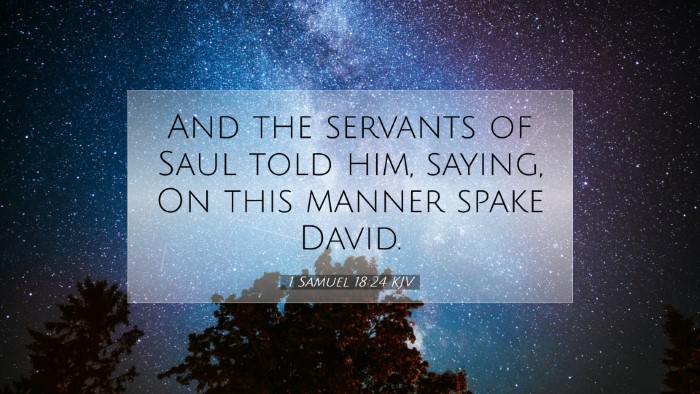1 Samuel 18:24 Commentary
Bible Verse: 1 Samuel 18:24 - "And the servants of Saul told him, saying, On this manner spake David."
Introduction
The narrative of David's early relationship with King Saul is critical in understanding the complexities of divine providence and human interactions in the biblical text. This verse captures a moment of intrigue that highlights the dynamics of power, loyalty, and the emerging conflict between Saul and David.
Contextual Background
This verse occurs in the wider context of 1 Samuel, where David has recently been anointed by Samuel and has gained value in the eyes of Israel for his victory over Goliath. Saul’s affection for David evolves into jealousy as David’s popularity rises. Understanding the background of these events is essential to grasping the full significance of David’s spoken words and their implications.
Analysis of the Verse
1 Samuel 18:24 presents a moment wherein Saul's servants report to him David’s words. This indicates the growing scrutiny and attention David attracts within the king's court. The commentary from various public domain sources provides deeper insights into the implications of this verse.
Matthew Henry's Commentary
Matthew Henry elucidates the significance of David's words as they reflect his humble demeanor amidst the rising tension. He remarks on the irony in Saul’s court, where David’s talents and God-given abilities stir both admiration and envy:
- Human Interactions: Henry highlights the nature of human relationships within the royal court, emphasizing how popularity can create rivalries and division. Saul’s servants are portrayed as intermediaries, caught in the conflict between their king and his rising champion.
- Divine Sovereignty: He underscores the theme of divine sovereignty, where God’s anointing on David sets the stage for future events. Henry suggests that David’s unassuming response reflects his reliance on God and not on human approval.
Albert Barnes’ Commentary
Albert Barnes comments on the structure of the verse, focusing on the roles of Saul's servants and David. He proposes the following:
- Role of the Servants: Barnes suggests that the servants serve not only as bearers of news but also as instruments in the unfolding drama between Saul and David. Their actions reflect the tension and unease in the palace.
- David's Character: Barnes paints a picture of David as a man of integrity, whose speech betrays no intent of rebellion against Saul. Instead, he expresses a view grounded in respect and servitude, which ultimately stands in stark contrast to Saul’s escalating paranoia.
Adam Clarke's Commentary
Adam Clarke offers a unique perspective on this verse by exploring the nuances of David's interaction with Samuel, Saul, and the servants. Clarke notes:
- Rhetorical Implications: Clarke emphasizes that David’s words, which are reported back to Saul, serve as a rhetorical tool that showcases the benevolent and unthreatening nature of David. He suggests that this reflects David's wisdom in navigating a delicate situation.
- Spiritual Perspective: By framing David’s speech through a spiritual lens, Clarke interprets it as a revelation of God’s plan, suggesting that David’s ascendance is indeed part of divine providence. This perspective invites deeper theological reflection on the notion of God choosing leaders amidst human imperfection.
Theological Reflections
This verse and its surrounding context prompt critical theological considerations regarding leadership, jealousy, and divine purpose:
1. Leadership Dynamics
The relationship between Saul and David symbolizes the complexities in human leadership. Saul's increasing jealousy fosters a toxic environment, contrasting David’s humble and faithful character. The Church today can reflect on how godly leadership should model humility and service rather than competition.
2. Divine Sovereignty and Providence
The unfolding story suggests that God is at work, even through flawed human interactions. God raises David, and while Saul seeks to undermine him, the providential hand of God cannot be thwarted. This encourages believers to trust in divine plans amidst adversities.
3. Human Relationships
The servants play a pivotal role in conveying messages, illustrating the importance of communication within communities. Within church settings, believers must be mindful of how they share information about others, fostering unity rather than division.
Conclusion
1 Samuel 18:24 serves as a powerful reminder of the complexities involved in the narratives of rising leaders and the dynamics of jealousy. Through the lenses provided by Matthew Henry, Albert Barnes, and Adam Clarke, we gain invaluable insights into the implications of the verse for our understanding of leadership, divine providence, and human relationships. This verse not only sheds light on theological inquiries but also encourages a reflective stance on how we engage with others within our communities of faith.


